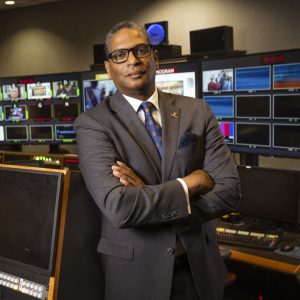By: Christina Royster, MSU Class of 1993
High-Achieving Alum Travis Mitchell Proves HBCUs Matter
When Morgan State University alum Travis Mitchell (Class of ’92) was in preschool, the campus of Shaw University in Raleigh, North Carolina, was his playground. His mother, uncle and aunt worked on campus, so he often played there after school while waiting for his mother to finish work. However, as he continued to grow in years, he also grew in awareness of the value of growing up on an HBCU campus, feeling affirmed by the largely African American group of students, faculty and staff members he knew and by the unwavering support the alumni showed the school. In many ways, he says, it became his “Wakanda.”
“When it came time for me to choose a college, I did so as an athlete, a basketball player. I was also an honors student with a solid GPA and SAT scores and many AP courses on my transcript,” Mitchell says. “I had plenty of colleges recruiting me and did not face the Jim Crow restrictions that my parents had.”
However, because of his connection with Shaw University, the type of college experience he desired was already defined. “I was in search of an HBCU experience,” albeit a little farther from home.
That was when Mitchell’s father, a Shaw Hall of Fame player and coach, introduced him to Morgan State University’s basketball coach, Nat Frazier, who recruited him to Morgan with an offer to play basketball. He also received a full academic honors scholarship.
When his basketball career at Morgan ended early, he became an assistant editor and later editor-in-chief of the student newspaper, The Spokesman. In this capacity, he says, his identity expanded from student editor to student leader, which contributed to the development and growth of Morgan State University as a whole.
Thirty years ago, it was students who — with faith in Morgan and a belief that HBCUs matter, during a critical time in Morgan’s history — planted seeds of possibility that have manifested the artifacts of their vision.
-Travis Mitchell, MSU Class of 1992
Protest Leader
 “While covering a protest being planned by student leaders across campus to address frustrations with poor dormitory conditions and safety concerns, among other issues, I was drafted to be a spokesperson to present our case to the school administration and the public,” Mitchell says. “We discovered quickly that most of the issues we faced as Morgan students stemmed from historic underfunding of Morgan by the State of Maryland,” a fact recently acknowledged by the Maryland General Assembly’s historic $577-million settlement with the state’s four public HBCUs.
“While covering a protest being planned by student leaders across campus to address frustrations with poor dormitory conditions and safety concerns, among other issues, I was drafted to be a spokesperson to present our case to the school administration and the public,” Mitchell says. “We discovered quickly that most of the issues we faced as Morgan students stemmed from historic underfunding of Morgan by the State of Maryland,” a fact recently acknowledged by the Maryland General Assembly’s historic $577-million settlement with the state’s four public HBCUs.
So Mitchell became the spokesperson for about 200 students in a weeklong sit-in in Morgan’s administration building. Together, the students began direct negotiations with then Maryland Gov. William Donald Schaefer and mobilized stakeholders from Morgan, Baltimore and the entire state to support their cause, through massive rallies of thousands of people in Annapolis. They also held a hunger strike and called for the immediate support by the State of the 25-year capital improvement plan that had already been submitted by MSU President Earl S. Richardson.
“This reminded me of similar problems I had become privy to at Shaw University and many of the HBCUs across the country,” Mitchell says. “HBCUs have notoriously been underfunded by states. So, while fighting for what we believed, and as the spokesperson for the movement, I became the target of hatred. I received death threats from the KKK and hate mail calling me all sorts of monkeys and apes. I was 19 years old.”
Mitchell says that “with the echoes of the songs of the civil rights movement ringing in our ears, the students were not deterred but bolstered, instead, by the courage of (our) convictions.”
Today, Mitchell serves as senior vice president and chief content officer for Maryland Public Television, where he is the highest-ranking African American in the organization’s more than 50-year history.
Catalyst for Change
When negotiations stalled with the governor after they ended their protest on campus, Michell says, he joined four other students on a 40-mile march to Annapolis. After leaving the steps of Truth Hall on Morgan’s campus, they arrived in Annapolis 13 hours later to meet with the governor.
“We were hungry, and we were tired. But we were also determined,” he says. “And when we arrived, we were greeted by a crowd of supporters who had been monitoring our progress on the news. They were white, Black, Republican and Democrat. They were people committed to the greater good.”
Little did he know that the student-led protest of 30 years ago would be the catalyst for change that resulted in more than $1.5 billion in capital improvements at Morgan since then.
“There is no doubt that the capable, steady and visionary stewardship and leadership of Morgan Presidents Dr. Earl S. Richardson and Dr. David K. Wilson over the past 38 years, along with a supportive Morgan community, are responsible for the University’s tremendous growth,” he adds. “However, 30 years ago, it was students who — with faith in Morgan and a belief that HBCUs matter, during a critical time in Morgan’s history — planted seeds of possibility that have manifested the artifacts of their vision.”

Full Circle, With Honors
Today, Mitchell serves as senior vice president and chief content officer for Maryland Public Television, where he is the highest-ranking African American in the organization’s more than 50-year history. Building on 25 years of media marketing and management experience, including recent roles as executive vice president and chief operating officer of the Atlanta-based Black Family Channel and chief content officer for UNC-TV in North Carolina, where he co-executive produced the Emmy award-winning documentary “Shaw Rising,” which chronicles the history of Shaw University as the oldest HBCU in the South. Mitchell came full circle to his familial ties with Shaw in 2021, when he was appointed to the university’s Board of Trustees and received an honorary Doctor of Humane Letters, in recognition of his more than 25 years of service to the community as a media and nonprofit organization executive.
Now at the helm of Maryland Public Television’s Content Division, Mitchell has shepherded innovative initiatives such as HBCU Week and the production of MPT’s acclaimed national PBS documentaries “Harriet Tubman: Visions of Freedom” and “Becoming Frederick Douglass.”
However, he says the “project” he has been most blessed to oversee is the parenting, with his wife, Angela, of their daughter, Trae, a Spring 2023 graduate of MSU who received a Bachelor of Science in Multimedia Journalism from the School of Global Journalism and Communication. Like her father once did, Trae Mitchell worked for The Spokesman newspaper, serving as managing editor.
When asked about the impact of HBCUs on his life, Travis says, quite simply, “No Shaw. No Morgan. No me! Like the anthem of our student protest says, ‘All of my love, peace and happiness I am going to give to Morgan!’ ”





